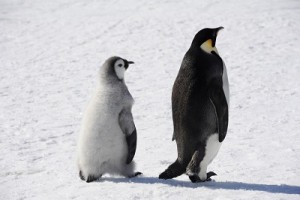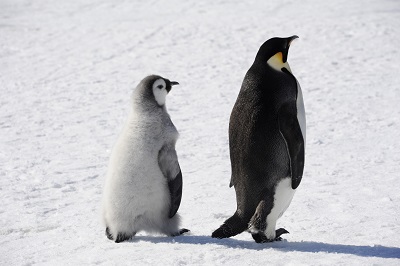 Emperor and Adelie penguins are two species of this flightless bird that live in the Antarctic. Adelies spend most of the year in the water. In October, spring begins in the southern hemisphere, including in the South Pole where Adelies live, and these penguins come onto the land to lay their nests, mate, and raise chicks. The nest of the Adelie is lined with pebbles, and the penguins are very careful about the pebbles they choose. A good pebble can lead to fights if several penguins want it, and a penguin will steal another penguin’s pebble if they are not paying attention.
Emperor and Adelie penguins are two species of this flightless bird that live in the Antarctic. Adelies spend most of the year in the water. In October, spring begins in the southern hemisphere, including in the South Pole where Adelies live, and these penguins come onto the land to lay their nests, mate, and raise chicks. The nest of the Adelie is lined with pebbles, and the penguins are very careful about the pebbles they choose. A good pebble can lead to fights if several penguins want it, and a penguin will steal another penguin’s pebble if they are not paying attention.
Male and female Adelie’s work together incubating the eggs and raising the chicks. The female lays two eggs and the male takes the first turn incubating them. After they hatch, in about 35 days, one parent watches them while the other gets food. As the chicks grow, they are left in groups called crèches, so that both parents can hunt for them. By February, as it is getting close to fall in the South Pole, the chicks have fully developed feathers and are ready to leave the land and go onto the ice.
Emperor penguins are the tallest, heaviest, and deepest diving penguins. They also are the only penguins who raise their young during Antarctic winters. The penguins come out of the sea in March and walk, sometimes great distances, to breeding grounds. Most colonies breed on ice, although a few do so on the ground.
In May or early June, the female lays a single egg and transfers it to her mate. The male incubates the egg for two months in a pouch called the brood pouch. Many males will huddle together, taking turns being on the inside and outside, to stay warm. During this time, the females go off to hunt. Like the Adelies, males and females take turns protecting and providing food for the newborns until they get old enough to be left alone while both parents hunt. In December or January, they return to the sea.
Emperors are well designed for their difficult tasks, including surviving the cold, going without food for long periods of time, and making many hard trips to and from the sea. If they go so deep in the water that the pressure becomes greater than their lungs can handle, they can collapse their lungs and slow down their heart rates to save oxygen. They also store additional oxygen in muscle tissue. Research about this oxygen storage ability may help human stroke victims, who also suffer from a lack of oxygen.
Global warming presents severe problems for the Adelie and Emperor penguins. Melting of the ice in Antarctica will reduce the amount of space the penguins have to hunt and live for most of the year. Rising temperatures will also bring more rain and liquid water to Antarctica, which is currently the driest place on Earth. Melted water can destroy the pebble-protected nests of the Adelies. In the Western Antarctic peninsula, where global warming has had the greatest effect, penguin populations have decreased by 80%.


That makes much more sense. Thanks!
Studies show that the ability to manage their lung capacity and to regulate the oxygen levels in their blood and muscles seems to be a natural part of their physiology (how their bodies function). We can only guess but, since this is part of their physiology it is doubtful that this hurts them.
In order for a chick to survive, the egg must stay warm. Once a female lays her egg, she passes it right away to her male mate. The male keeps the egg warm until it hatches.
when the article says ” If they go so deep in the water that the pressure becomes greater than their lungs can handle, they can collapse their lungs and slow down their heart rates to save oxygen,” are the penguins hurting themselves in the process of getting food?
Do penguins start incubating their eggs right after they hatch, or do they wait a certain amount of time?
– Ana
Good news for penguin lovers! Here’s an article about a new colony of penguins found on East Antarctica’s Princess Ragnhild Coast.
http://news.yahoo.com/babies-abound-penguin-colony-found-poop-162946951.html